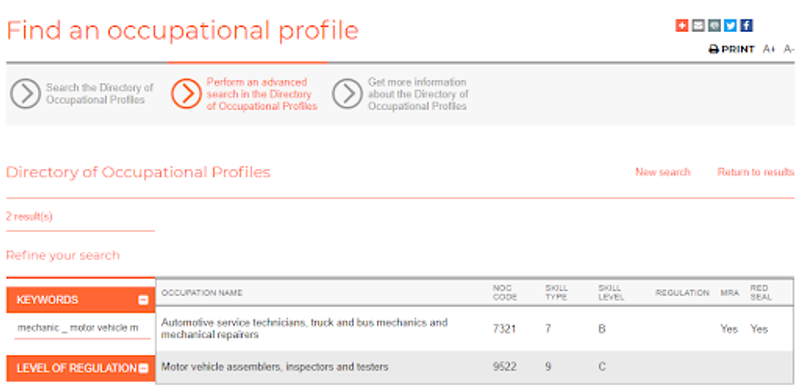Do you want to apply for a job in Canada but aren’t sure if you need to be or how to get accredited? The Canadian immigration system is very specific, especially when it comes to working in a skilled job in Canada. Certain professions such as those in the medical field and specialized trades need to be accredited. This is to ensure that your skill is at the same level as Canadian standards. Approximately 30,000 Canadian work visas are issued to foreign workers every month and about 24,000 Invitations to Apply (ITAs) for permanent residency through programs under the Express Entry system.
Being able to
How to Get Canadian Accreditation

How to Find Out if You Need Accreditation
If you fall under one of the following categories you will need to have your credentials assessed.
- Plan to immigrate to Canada as a Federal Skilled Worker;
- Plan to live and work in Canada in a specific profession or trade; or
- Plan to study in Canada.
What are credentials?
Your credentials include:
Credentials that need to be assessed
- Education (if completed outside of Canada);
- Work experience; or
- Professional credentials.
How to Get Accredited as a Federal Skilled Worker (FSW)
Federal skilled workers need to get Educational Credential Assessments (ECAs) to get a job in Canada. This includes any educational credentials acquired outside of Canada, like a:
- diploma;
- certificate;
- foreign degree; or
- other proof of your credential.
Certain jobs in Canada also require that your skills and training are assessed and accredited.
Typical Jobs in Canada That Need Accreditation

Certain occupations in Canada, particularly trades, require having your skills evaluated.
Canada has two kinds of jobs; regulated and non-regulated.
Regulated jobs
Regulated jobs in Canada are controlled by provincial, territorial and on occasion, federal laws and are also governed by regulatory bodies or apprenticeship authorities.
About 20 percent of jobs in Canada are regulated jobs that are either referred to as professions, skilled trades, or apprenticeable trades, such as architects, plumbers, and engineers.
It is particularly important that they are regulated to ensure public health and safety as well as to make sure that employees are qualified.
You will need the following to work in a regulated occupation in Canada.
Requirements to work in a Regulated Job
- A license or certificate; or
- Be registered with the regulatory body for your job in the province or territory to want to work in.
Remember that requirements can differ from province to province and you will be evaluated based on your own merits (on a case by case basis) but it usually involves:
- having your training and skills assessed against the job’s standards
- this is done by comparing your training with the training provided by Canadian colleges and universities
- you’ll need to show your original academic transcripts and other related documents, such as university course descriptions
- having your language and communication skills tested
- written exams, an interview or both
- a specified period of supervised work experience
Trades
Trade workers may be eligible to apply under the Federal Skilled Trades Program (FSTP).
Depending on your trade, for example, if you’re a baker, carpenter, or electrician, you may need a Red Seal.
Non-regulated jobs
Non-regulated jobs in Canada don’t necessarily require having accreditation; however, it could be requested by your Canadian employer. This is why it’s better to get accredited, regardless of your occupation requirements as it could improve your chances of being hired.
| Typical Jobs in Canada that Require Accreditation |
|---|
| Professional Jobs |
| Doctors |
| Registered Nurses |
| Architect |
| Trade Jobs |
| Doctors |
| Industrial butchers |
| Electricians |
| Plumbers |
| Bakers |
Important to note
No matter what job or occupation you work in, language skills in English and/or French are a must. But unfortunately for some professions having the skill is not enough. It is more important to check what level your language skills need to be based on your occupation.
Credential Assessment Process

Step 1: Create a Job Market Report
You can create a report by using Job Bank, the official government job search board. You’ll be able to find information about your main duties, wages, whether or not it’s regulated, training, and skills requirements as well as give you the contact information for your regulatory body or apprenticeship authority.
Step 2: Find your occupational profile
You can learn more about your specific occupational profile by visiting the CICIC website. All you will have to do is fill in your occupation or National Occupation Classification code as well as the province or territory you want to work in. This will tell you if your occupation is regulated or not, your skill level and type as well as whether or not you need a red seal (trades).
For example, as a mechanic looking for work in Canada, you can see below that although your trade is non-regulated in Manitoba you will need a Red Seal certification.

Once you know what the requirements are you’ll be able to compare your skills with those required.
Step 3: Contact a Regulatory Body
The next step is to contact the regulatory board or authority in your chosen Canadian province to find out exactly what training, skills, or certification you need to get accredited. Some of these can be acquired before you arrive in Canada, such as your language assessments.
Step 4: Gather Your Documents
You may need some of the following documents:
- degrees, diplomas or certificates from:<.li>
- universities
- colleges
- secondary schools
- trade schools
- education-related:
- transcripts of grades
- program descriptions
- syllabi related to your studies
- letters from professional and other regulatory bodies
- apprenticeship or professional certificates
- employer:
- letters of reference
- performance reviews
- work descriptions for jobs you’ve done.
Depending on your regulatory board requirement you may be asked to submit translated documents in English and/or French. Make sure that you
- use an approved translation service (if so, you’ll have to pay for the translation)
- give them original documents or whether you’ll need a lawyer to notarize copies; and
- provide certified copies.
Step 5: Consult an Approved Assessment Agency
If having your credentials assessed isn’t part of applying for your license you may want to think about using an approved assessment agency. This will tell you if you:
- need to upgrade your skills or education to work in your occupation
- should consider looking for a different job in your field
- should look for a job in a different field
What’s My Next Step?





